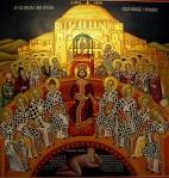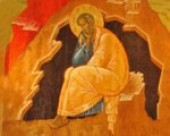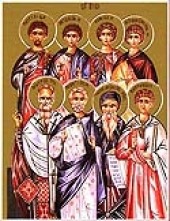
Our father among the saints Seraphim of Sarov was a Russian ascetic who lived at the Sarov Monastery in the 18th century, and is considered a wonder-worker. The Church commemorates St. Seraphim on January 2, and the opening of his relics on July 19. St. Seraphim of Sarov is one of the most beloved Orthodox saints of recent times (1759–1833). He is credited with acquiring in a most full way, the grace and the Spirit of God. He spent 1,000 days and nights on a rock praying to God for forgiveness. He was a hermit, spiritual guide and priest. He led many christian souls along the path in of apostolic Christianity in Russia during the 19th-century. Born on July 19, 1754, at Kursk, Russia. His parents, Isidore and Agathia Moshnin, lived in Kursk, Russia; Isidore was a merchant. At the age of 10, Seraphim became seriously ill. During the course of his illness, he saw the Mother of God in his sleep, who promised to heal him. Several days later there was a religious procession in Kursk with the locally revered miracle-working icon of the Mother of God. Due to bad weather, the procession took an abbreviated route past the house of the Moshnin family. After his mother put Seraphim up to the miracle-working image, he recovered rapidly. While at a young age, he needed to help his parents with their shop, but business had little appeal for him. Young Seraphim loved to read the lives of the saints, to attend church, and to withdraw into seclusion for prayer.
He started as meek and labor-loving monk but later on as a ascetic recluse and finally a spiritual guide to thousands of souls in Russia, St. Seraphim remains one of the most beloved saints in his own land, and is known universally as a miracle-worker and a glorious bearer of God’s grace.

Orthodox spirituality has produced many holy and famous men, but none in recent centuries to compare with Seraphim of Sarov. He started as a monk working with people and then he was led to become a hermit. He lived deep in the forest and was all alone with only his pet bear, Misha, to keep him company. But, his solitude was interrupted when he was attacked by bandits. So he returned to the community and in 1825, after fifteen years in silence, he began to receive visitors again and to spend his energies in their spiritual direction. By means of his faith and asceticism he performed a number of miracles. His fame and humility brought a steady stream of visitors, religious and royalty alike, to him for advice. Tsar Nicholas wanted to appoint Seraphim as the Metropolitan of St. Petersburg. This was not to the austere monk’s taste. He remained a private meditative counselor until his death. The church proclaimed him a saint in 1903. His humility and concern for people made Sarov a center of pilgrimage until the events of the 1917 revolution.
For 45 years he led the life of a contemplative, first in the monastery and then in an isolated hut. Eight years before his death he opened his cell to visitors so that they might seek his advice. It was said he could supply answers before visitors had time to ask their questions. He counseled tough cases of conscience and reportedly worked miracles, healing the sick. Gentle but firm with others, he was very severe with himself. He spent many nights in continual prayer. Depth in spiritual prayer was open, he said, to all Christians. Through his teaching and his life, he revived monasticism as a helpful force to common believers in the Russian Orthodox church.
For St. Seraphim emphasized that the whole purpose of life was to be filled with the Holy Spirit. Doing good in Christ’s name was but a means to this end. He saw contemplation, self-denial and meditation as means of bringing oneself to ecstatic prayer.
Once while discussing the topic with his disciple Motovilov, he became so shining that Motovilov could not at first look at him. His eyes were flashing like lightning, and his face shone like the sun. When finally able to lift his eyes to gaze upon his master, Motovilov was filled with peace and joy. This peace and joy, said Seraphim, was the peace and joy Christ promised the disciples at the last supper when he said, “My peace I give unto you,” and “your sorrow will be turned to joy.”
The interior of St. Seraphim’s cell at his Far Hermitage
QUOTES from St. Seraphim of Sarov
“Maintain a spirit of peace and you will save a thousand souls.”
Kingdom of God awaits those who have patiently endured. And all the glory of the world is nothing in comparison.“The reading of the word of God should be performed in solitude, in order that the whole mind of the reader might be plunged into the truths of the Holy Scripture, and that from this he might receive warmth, which in solitude produces tears; from these a man is wholly warmed and is filled with spiritual gifts, which rejoice the mind and heart more than any word.”
God is a fire that warms and kindles the heart and inward parts. Hence, if we feel in our hearts the cold which comes from the devil—for the devil is cold—let us call on the Lord. He will come to warm our hearts with perfect love, not only for Him but also for our neighbor, and the cold of him who hates the good will flee before the heat of His countenance.
The body is a slave, the soul a sovereign, and therefore it is due to Divine mercy when the body is worn out by illness: for thereby the passions are weakened, and a man comes to himself; indeed, bodily illness itself is sometimes caused by the passions.

Without sorrows there is no salvation. On the other hand, the
Those who have truly decided to serve the Lord God should practice the remembrance of God and uninterrupted prayer to Jesus Christ, mentally saying: Lord Jesus Christ, Son of God, have mercy on me, a sinner.
When despondency seizes us, let us not give in to it. Rather, fortified and protected by the light of faith, let us with great courage say to the spirit of evil: “What are you to us, you who are cut off from God, a fugitive for Heaven, and a slave of evil? You dare not do anything to us: Christ, the Son of God, has dominion over us and over all. Leave us, you thing of bane. We are made steadfast by the uprightness of His Cross. Serpent, we trample on your head.”
“It is necessary that the Holy Spirit enter our heart. Everything good that we do, that we do for Christ, is given to us by the Holy Spirit, but prayer most of all, which is always available to us,”
“Prayer, fasting, vigil and all other Christian practices, however good they may be in themselves, do not constitute the aim of our Christian life, although they serve as the indispensable means of reaching this end. The true aim of our Christian life consists in the [increasing] acquisition of the Holy Spirit of God. As for fasts, and vigils, and prayer, and almsgiving, and every good deed done for Christ’s sake, they are only means of acquiring the Holy Spirit of God.”
“…the people who, in spite of the bonds of sin which fetter them and hinder them (by constraint and by inciting them to new sins), come to Him, our Savior, with perfect repentance for tormenting Him, who despise all the strength of the fetters of sin and force themselves to break their bonds – such people at last actually appear before the face of God made whiter than snow by His grace. ‘Come, says the Lord: Though your sins be as scarlet, I will make them whiter than snow’ (Isa.
“Every success in anything we should refer to the Lord and with the Prophet say: ‘Not to us, O Lord, not to us, but to Your name give glory’ (Ps. 113:9).”
“The true aim of our Christian life consists in the acquisition of the Holy Spirit of God… But… only the good deeds done for Christ’s sake bring us the fruits of the Holy Spirit.”
“…only the good deed done for Christ’s sake brings us the fruits of the Holy Spirit. All that is not done for Christ’s sake, even though it be good, brings neither reward in the future life nor the grace of God in this life. That is why our Lord Jesus Christ said: ‘He who gathers not with Me scatters’ (Lk.
The stone on which St. Seraphim stood and kneeled for 1000 days and nights
Link:
Acquiring The Holy Spirit, the goal of Christian life
Seraphim of Sarov: Orthodox Wiki
St. Seraphim of Sarov Life and Teachings: Orthodox Photos . com by Bishop Alexander (Mileant), translated by Nicholas and Natalia Semyanko
St Seraphim of Sarov – Life and Teachings: Missionary Leaflet # EA08 Copyright © 2001 Holy Trinity Orthodox Mission
Saint Seraphim of Sarov On Acquisition of the Holy Spirit: Missionary Leaflet # E88 Copyright © 2001 Holy Trinity Orthodox Mission
Repose of the Venerable Seraphim the Wonderworker of Sarov: Orthodox Church of America
Uncovering of the relics of the Venerable Seraphim of Sarov: Orthodox Church of America
A Wonderful Revelation to the world: Orthodox Info . com – by New Sarov Press.
Lives of the Saints – St. Seraphim of Sarov: Antiochian Orthodox Christian Archdiocese of North America
St. Seraphim of Sarov: Antiochian Orthodox Christian Archdiocese of North America – by Aaron Farha (Jan. ’02)
The Story of St. Seraphim of Sarov: On Earth As In Heaven
St Seraphim of Sarov: from Orthodox Saints Vol 1, by Fr. George Poulos Holy Cross Orthodox Press
Seraphim of Sarov (1759-1833) Saint of the Russian Orthodox Church: Monk, ascetic, and starets
80 Miracles Worked by St. Seraphim of Sarov: Published by Pravda.ru, June 23, 2003
Life of Saints For Children – Saint Seraphim of Sarov: by Father Nektarios Serfes. (c)Father Nektarios Serfes
LIFE OF ST. SERAPHIM OF SAROV (1759 – 1833): written by Jane M. deVyver, M.Th., Ph.D.
Saint Seraphim of Sarov On Acquisition of the Holy Spirit: Greek Orthodox Church . org
SAINT SERAPHIM OF SAROV: Page Written By H. G. H.
The Prayer Rule of St Seraphim of Sarov: Ukraine Orthodoxy – Dr. Alexander Roman
Saint Seraphim of Sarov – Russian Saints: Orthodox World . ru
ST. SERAPHIM OF SAROV, HERMIT: From Orthodox Saints, Vol. I, by Fr. George Poulos (Holy Cross Orthodox Press)
St. Seraphim of Sarov on Receiving Holy Communion: by Archimandrite Lazarus Moore. New Sarov Press,
The 100th Anniversary of the the Glorification of St. Seraphim: Priest Sergei SVESHNIKOV – ROCOR
A Righteous Man Lives Forever…100th anniversary: by Archbishop Averky (Taushev)
 Reliquary with the relics of St. Seraphim today
Reliquary with the relics of St. Seraphim today




 Christian Dogma
Christian Dogma Christian Martyrs
Christian Martyrs Christian Orthodox Churches and Monasteries
Christian Orthodox Churches and Monasteries Christian Sermons and News
Christian Sermons and News Church's Teachings on Fasting
Church's Teachings on Fasting Ecumenism – a Great Heresy
Ecumenism – a Great Heresy Father George Calciu
Father George Calciu Life_a Sacred Gift form God
Life_a Sacred Gift form God Orthodox Saints and Church Fathers
Orthodox Saints and Church Fathers Spiritual Elders
Spiritual Elders Daily Bible Readings
Daily Bible Readings Journey to Orthodoxy
Journey to Orthodoxy Listen to Ancient Faith Radio
Listen to Ancient Faith Radio Orthodox Calendar of Feasts and Saints
Orthodox Calendar of Feasts and Saints Orthodox Christian Mission Center
Orthodox Christian Mission Center Orthodox Institute
Orthodox Institute OrthodoxChristianNetwork TV
OrthodoxChristianNetwork TV
5 comments
Comments feed for this article
January 3, 2010 at 9:53 PM
christianityisdead
Interesting posts you have, though I think Christianity is dead and will be redeemed and brought to fruition and perfection through Thelema. Check out my blog at http://christianityisdead.wordpress.com/ if you will. Love is the law, love under will. ;)
January 4, 2010 at 9:01 PM
orthodoxword
Christianity is not dead, my friend, perhaps you confuse it with the state of so many souls, that have drawn away from God and became dead or lay in despair.
The love you referring to is humanistic and has no true value, rather it kills one’ soul and brings even more despair. Such love is falls. If you stripe someone – so “filled with this kind of humanistic love” – by his worldly honor, fame, power, goods and everything that belongs here on this Earth, and you luck that man up in a cell with 2 other inmates (that he pretended he loved) in a few hours he will go in sane…
True love is sacrificial, it is the supreme model that our Lord and Savior Jesus Christ showed it to us on the cross.
And so what you call “Thelema” is just another game of a plastic universe invented by man, a game that will become old sooner than you’ll expect and you’ll find yourself empty again, in despair, over and over. Because the soul cannot find peace until it rests in HIM – Christ.
I’ll pray that the Lord may open the eyes of your soul so you may see. I’ll suggest to start reading the early Holy Fathers of the church and work your way up in humbleness to today’s great Elders and you might be surprised by the contrary.
Christianity is alive in those souls open to receive it! Peace!
April 15, 2010 at 7:54 AM
Russian Partizan
Great collection of links, goes to bookmarks, thanks!
And here is the link to English page on the new web-site of The Holy Dormition Sarov Monastery (Russia) – http://www.sarov-monastery.org/english/
May 15, 2010 at 5:30 PM
Janna Alley
Where is the full height icon of St. Seraphim from above?
May 15, 2010 at 5:49 PM
orthodoxword
Hi There! Not sure if I understood your question…there are many icons of St Seraphim painted by the faithful through out the world, and the photos that you see here are taken from many sources.